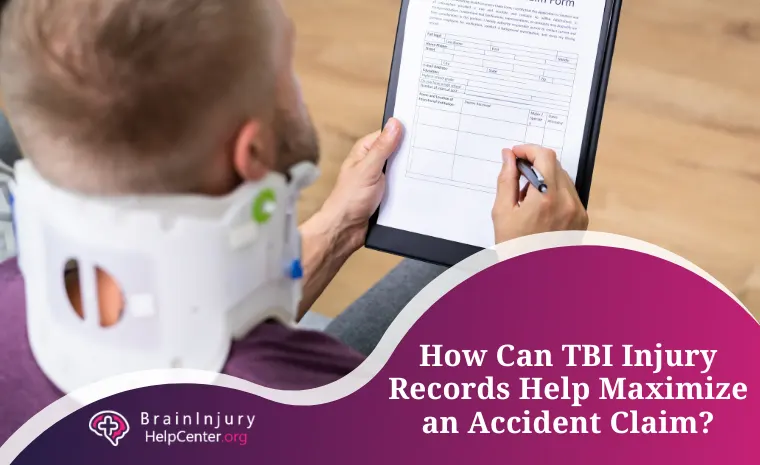How Can TBI Injury Records Help Maximize an Accident Claim?
Have you or a loved one suffered a traumatic brain injury (TBI) in an accident? If so, you may be entitled to compensation for your damages and losses. However, without proper documentation and evidence, your claim may be undervalued or denied altogether.
Sustaining a traumatic brain injury (TBI) due to an accident can have long-lasting effects on your life. It can impact your physical health, emotional well-being, and financial stability. When seeking compensation for your TBI, having accurate traumatic injury medical records is essential to maximize your TBI claim.
In this article, we are going to discuss:
- Understanding Traumatic Brain Injuries
- The Importance of TBI Injury Records
- Types of TBI Injury Records
- Establishing Causation and Liability
- Proving the Extent of Damages
- Utilizing TBI Injury Records During Negotiations
- Presenting TBI Injury Records in Court
Have you received a TBI diagnosis following a non-fault accident?
Understanding Traumatic Brain Injuries (TBIs)
A traumatic brain injury occurs when a sudden blow or jolt to the head disrupts normal brain function, such as a gunshot wound, a skull fracture, head traumas from an accident, and more.
TBIs can result from various accidents, such as motor vehicle collisions, falls, car crashes, or workplace incidents. These injuries can range from mild concussions to severe injuries and brain damage, affecting cognitive functioning, and leading to physical long-term disabilities and emotional challenges.
It is important to understand the impact of TBIs, as they can have a profound effect on a person’s quality of life. Whether you have experienced a TBI yourself or know someone who has, it is crucial to be aware of the signs and symptoms, as well as the treatments available.
The Importance of TBI Injury Records
What are TBI injury records, and why are they important?
Brain Injury records help medical professionals understand the extent of the injury and provide appropriate treatment. These can also help in legal cases, such as in filing workers’ compensation claims or personal injury lawsuits. TBI injury records can help in predicting the long-term effects of the injuries, such as cognitive impairment or behavioral changes, and develop strategies to manage them with rehabilitation services.
TBI injury records play a pivotal role in maximizing an accident claim. These provide documented evidence of your injury, its severity, and its impact on your life. Insurance companies and legal professionals heavily rely on these records to assess the validity of your claim and determine the compensation you deserve.
Comprehensive TBI injury records help establish a strong case by providing concrete evidence of the accident’s consequences and the resulting damages.

Types of TBI Injury Records
Establishing a traumatic brain injury (TBI) in a personal injury case is a challenging task. It involves gathering evidence from multiple sources to prove that the head injury indeed occurred, its severity, and its direct correlation to the incident in question.
To build a solid accident claim, individuals with brain injury need to gather various types of records, such as:
Medical Reports and Diagnoses
These records outline the specific type of brain injury you sustained, the symptoms patients experienced, and the medical treatments received. They also provide objective evidence of the injury’s existence and its connection to the accident.
Imaging and Diagnostic Tests
Imaging and diagnostic tests, such as CT scans, magnetic resonance imaging (MRIs), and X-rays, offer visual evidence of brain trauma. These records can reveal physical abnormalities, brain bleeds, or structural damage, supporting your claim for compensation. Including these records in your case strengthens the validity of your injury and its impact on your well-being.
Treatment and Therapy Records
TBI injury records should include a comprehensive history of the treatments and therapies you underwent. This may involve surgeries, medication prescriptions, rehabilitation sessions, occupational therapy, and cognitive training. These records demonstrate the ongoing care required for your recovery and serve as evidence of the financial burdens associated with your severe head injury.
Rehabilitation Progress Reports
Rehabilitation progress reports outline your journey toward recovery, including improvements, setbacks, and future prognoses. These records highlight the ongoing challenges you face due to the TBI and can justify the need for additional compensation to support your long-term well-being.
Witness Statements and Police Reports
Eyewitness testimonies can provide firsthand accounts of the accident, supporting your version of events. Police reports can offer important details regarding the accident scene, the parties involved, and any citations issued.
Have you experienced a TBI from an accident and are unsure of your next steps?
Utilizing TBI Injury Records During Negotiations
When negotiating with insurance companies or opposing parties, TBI injury records are powerful tools. Presenting clear and concise records that outline the severity of your injury and its consequences puts you in a stronger position to secure a fair settlement. These records serve as undeniable proof of your claims, urging the other party to consider a reasonable compensation offer.
It is essential to have the legal advice and guidance of a personal injury attorney during negotiations. This ensures that your rights are respected and that you receive fair compensation for your TBI case.
Presenting TBI Injury Records in Court
If your accident claim proceeds to court, TBI injury records become even more critical. Presenting organized, well-documented records to the judge and jury can significantly sway their decision in your favor.
Your personal injury attorney can provide legal representation and use these records to build a persuasive argument and effectively communicate the extent of your damages, resulting in a favorable outcome for your claim.
TBI Injury Records: Frequently Asked Questions
Here are some frequently asked questions related to traumatic injuries and the records needed to prove them:
How can I obtain TBI injury records?
To obtain TBI injury records, consult with healthcare providers who treated your brain injury. Request copies of medical reports, imaging tests, treatment records, rehabilitation progress reports, and any other relevant documentation. Additionally, gather witness statements, police reports, and expert opinions, if available.
What other evidence should I gather to support my claim?
In addition to TBI injury records, gather any other relevant evidence, such as photographs of the accident scene, video footage, eyewitness testimonies, and any correspondence with insurance companies or the opposing party. This evidence strengthens your case and provides a more comprehensive picture of the accident and its consequences.
Should I consult a lawyer for assistance with my accident claim?
Yes, a lawyer can navigate the complex legal process, handle negotiations, gather evidence, and advocate for your rights. They can also ensure that you maximize the use of TBI injury records to strengthen your claim.
How long do TBI injury records remain relevant to my claim?
TBI injury records remain relevant as long as they demonstrate the ongoing impact of the injury on your life. This includes ongoing medical treatments, therapy sessions, rehabilitation, and the financial and emotional challenges you continue to face. Keep records updated to accurately reflect your current situation.
Can TBI injury records help me secure a fair settlement?
Yes, TBI injury records provide concrete evidence of your injury, its severity, and the resulting damages. Insurance companies and opposing parties are more likely to offer fair compensation when faced with compelling TBI injury records that leave little room for dispute.
Don’t Face TBI Alone. Brain Injury Help Center Cares.
If you or someone you love experienced a traumatic brain injury due to an accident in California, don’t face this challenging journey alone.
The Brain Injury Help Center is here to provide you with the support and guidance you need. Our experienced team of professionals specializes in assisting people with brain injury and families throughout California.
Do not hesitate to contact us for assistance during this difficult time. The Brain Injury Help Center is available 24/7 to assist you.









